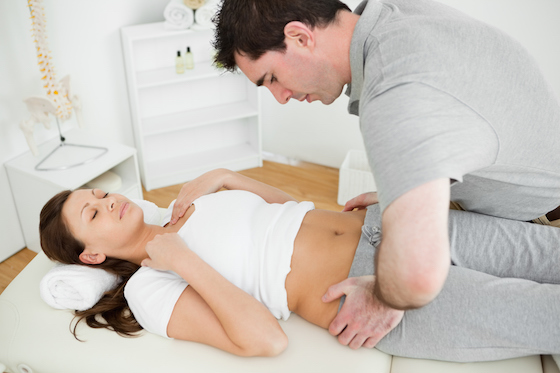
31 million Americans are currently suffering from low back pain, and an estimated 80% of us will have an incident of low back pain at some point in our lifetime. However, back pain can be a sign of low back, hip or sacroiliac joint dysfunction, so how can you determine the source of your discomfort?
Hip Pain
Hip problems typically present with pain in the groin area on the affected side, and the most common cause of hip pain is osteoarthritis of the joint. Ofte,n that type of pain comes and goes and gets more constant over time, leading to stiffness and pain with standing and walking. If the pain is above your belt line, then the hip is not your culprit.
What Should You Do if You Have Persistent Hip Pain
- Consult with your primary care physician to undergo specific tests to determine your need for possible diagnostic testing (x-rays, etc) or an anti-inflammatory medication
- Join a local gym or fitness facility as losing weight can be critical to treating hip pain
- Schedule a screening or initial evaluation with Kingwood Physical Therapy for more information and suggestions for managing symptoms
Back Pain
Back problems typically present with pain in the lower back; however, because of the anatomy of the area, including the spinal cord and nerves, this pain can often radiate to the legs. The most common cause of back pain is bulging or herniated discs and/or spinal stenosis. Spinal stenosis is a narrowing of the spinal column around the spinal cord and is typically relieved with flexion (ex, walking while leaning on a shopping cart or up a small incline). Herniated discs often cause symptoms such as pain in the back, buttocks, or hip, which shoots down your leg and worsens with sitting or bending. Typically herniated disc produces pain is improves with walking or standing, as the discs receive the most compression force while you are sitting, not while standing or walking. People often complain of “pinched nerve” or “sciatica” type pain, which is an irritation or inflammation of the nerves in the lower back, which can often radiate pain to the hip or upper region as well.
What Should You Do if You Have Persistent Low Back Pain
- Schedule an appointment with a physical therapist if your symptoms are not improving to receive a personalized exercise program and advice to avoid triggering your symptoms*
- Consult your primary care physician to undergo imaging tests if there is a potential for a serious underlying condition
- Stay active, as prolonged rest (more than 24-48 hours) is bad advice and may increase your symptoms
- Join a local gym or fitness facility, as maintaining an ideal weight helps to take pressure off your spine
- Avoid tobacco, as nicotine can impede circulation, leading to faster degeneration of your spine
It is important to remember that back pain or hip pain is not a true diagnosis but rather a general description of pain, and it is important to know the root cause of the problem in order to best treat your symptoms. Another relevant point to consider is that hip and low back problems are not mutually exclusive and may occur at the same time. This makes an accurate diagnosis imperative to determining the best course of treatment.
SI Joint Pain
SI is short for sacroiliac and refers to the joint between the iliac bones (part of your pelvis) and the sacrum (fused vertebrae at the very bottom of your spine). This joint is held together by very strong ligaments, but some minor movement may occur, which causes pain in the lower back or the back of the hips. This pain is worse with standing and walking and relieved by lying down.
What Should You Do if You Have Persistent SI Pain
- Try sleeping with a pillow between your legs
- OTC pain medications can be used to help manage pain while waiting for an appointment
- Ask your physical therapist for an evaluation
Physical therapy has been found to help patients with SI pain get pain relief, reduce inflammation and muscle spasms, improve healing, muscle extensibility, joint mobility, and range of motion, strength, muscle control, and gait mechanics.
